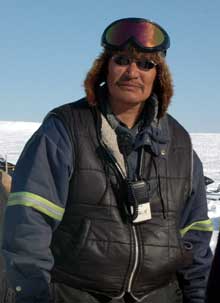 A few years ago, Inuit filmmaker Zacharias Kunuk had something of a hit with Atanarjuat: The Fast Runner (2001). Based on a story passed down from ages past through the oral tradition, the three-hour film won a passel of Genie Awards and was Canada’s nominee for the Best Foreign Language Film Oscar, though the Academy itself never gave it the nod.
A few years ago, Inuit filmmaker Zacharias Kunuk had something of a hit with Atanarjuat: The Fast Runner (2001). Based on a story passed down from ages past through the oral tradition, the three-hour film won a passel of Genie Awards and was Canada’s nominee for the Best Foreign Language Film Oscar, though the Academy itself never gave it the nod.
There was much talk, on the film’s official website and elsewhere, of how the film would help to revive ancient folklore and traditions that were lost when the Christian missionaries came. However, when pressed on this point by a writer for The American Prospect, Kunuk admitted that the film had ditched the violent ending of the original pagan myth, and replaced it with a pacifist, forgiveness-oriented climax that was “probably” traceable to the influence of those same missionaries.
Today, the Globe and Mail reports that Kunuk is putting the finishing touches on his follow-up, The Journals of Knud Rasmussen, which the Globe describes as “an epic tragedy about the clash between the nomadic world and Christianity”:
The heart of the epic tragedy is the story of Ava, the last great Inuit shaman and his beautiful and headstrong daughter, who struggle to survive and adapt as their world evolves (or devolves, depending on your perspective).
“It’s the story of the nomadic world and the Christian world colliding — and Christianity won,” says Kunuk, who has five children with his common-law wife. “When I was growing up, we were learning about Jesus Christ who walked on water, ran out of wine, and made water into wine. To us, that was a shaman. I was brought up on the Anglican side, and our minister didn’t allow us to dance or story-tell. In the seventies, those things were totally banned. They were the work of the devil. You had to go to church whether you liked it or not. The only time I didn’t go was when I was sick.
“In the sixties and seventies, our community was divided into two groups, the Anglicans and the Catholics. We couldn’t go out with Catholic girls. And on Sunday, we couldn’t play outside with our Catholic cousins. Now it’s really mixed. You can live on either side.”
With religion at its core, Kunuk knows the film is bound to stir up memories (good and painful) among the elders in his community. He expects there will be some debate about the film’s merit among his own people, but he feels it was a critical story to tell because it’s a window into his people’s past.
“I just always wanted to do a shaman/Christianity story,” explains Kunuk, who speaks both English and Inuktitut. “Like Atanarjuat, Ava figures large in the collective psyche of the region. He was like the messiah. Shamans became shamans when they were alone and saw the light. Jesus wandered in the desert for 40 days and 40 nights. Then he saw the light.”
The filmmakers hope to take this new movie to Cannes in May, and then to Canadian festivals in September. Should be interesting.












